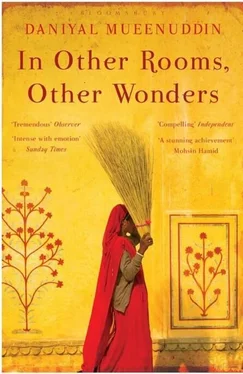‘I’ll speak with him,’ said K. K. ‘Now stop. You know the doctor’s orders. Do you want me to have another heart attack?’
She saw that she dare push him no further, and so gradually became quiet. Lying down on the bed, she wouldn’t get under the covers.
When K. K. woke Husna said, ‘Talk to Hassan now. I won’t stand the servants’ treatment of me anymore.’ Knowing she couldn’t yet win the larger battle, against Sarwat, she wanted at least to consolidate her smaller gains. She insisted that K. K. speak to Hassan in front of her, though he would have preferred not to humiliate the old servant.
The grizzled cook stood with his shoes off, having left them at the door, and with his lambskin hat clutched in his hand. He looked down at the floor, at his splayed bare feet planted on the polished rosewood parquet. Rafik waited by the door.
‘Bibi says that yesterday you swore at her.’
Husna had been waiting for some concrete provocation and had pounced when Hassan, in his habitual foul temper, called her a bitch under his breath.
‘Yes sir,’ said the old cook. ‘I mean no sir.’
‘Well, Hassan, did you or didn’t you?’
‘No sir.’
Husna became shrill. ‘I asked him not to put chilies in the omelet, and he swore at me. Ask the sweepress, she heard.’
Hassan looked at her squarely. ‘You and the sweepress.’
‘You can go,’ said Harouni, not raising his voice.
When Hassan had left, Harouni said to Rafik, who had been impassively watching this performance, ‘See that this doesn’t happen anymore.’
While she knew that now the old servants would be decided against her, Husna felt she could afford their ill will, for her position in the household grew stronger daily. The attitude of the servants changed after Rafik gave them the word. Only a few, the old ones, covered their insolence with glacial politeness, while the younger became either servile or friendly to the point of taking liberties, thinking thereby to win her favor.
Husna began to enjoy the advantages of her new position. The secretary, Shah Sahib, handled the household accounts, writing up all the expenses in a complicated double-entry bookkeeping system, so complicated in fact that K. K. couldn’t and wouldn’t take the trouble to understand it. For years the books had been larded with excessive expenses. The drivers, Hassan the cook, and Rafik lavishly inflated the bills they submitted. After Husna had a few times complained of not having money, of wearing torn clothes and broken-heeled shoes, K. K. instructed that she should be given a tiny allowance. In old age he had become tightfisted, although the household hemorrhaged money, and he spent two or three hundred thousand rupees a month without knowing where it went. Shah Sahib soon enlisted Husna in his system, since he didn’t want her to begin making inquiries, and so her allowance grew larger and larger each month, inflated in various ingenious ways.
She had the use of a car, bought herself clothes, even small bits of gold jewelry. In her rooms she kept one and then two locked steel trunks, which she filled with everything from raw silk to electric sandwich makers. She would come to K. K. with some special request, wanting to buy something, and he would ultimately agree. She wheedled, petted him, became frosty, became nice. Giving in, he would be unable to look her in the eye. She said to him, speaking plainly, ‘Scratch a man and find a boy.’
A few of K. K.’s old gentleman friends, mild landowners with courtly Punjabi manners, came to the decision that they had no reason for isolating the young girl. They called her ‘daughter’ and looked forward to her lively, flirtatious company. Among this group, who in old age constituted K. K.’s closest friends, he had always been the fast one, the sportsman and the lover. They envied him the possession of Husna, while at the same time being slightly relieved on reaching their lugubrious houses after a few hours in her company. Her striving wore on them. She flattered them, asked about their harmless projects — a Union of Punjabi Landowners, a pipe-dream society for tort reform — and so wielded them into a circle, with herself at the center. She teased them; sitting at Harouni’s side during bridge games, she would try to peek at his opponents’ cards. Playing rummy for small stakes with whoever was dummy in the bridge game, she cheated, and when caught laughed and denied it.
The air conditioner in the annex didn’t work properly, and on that pretext Husna moved into a study adjoining the master bedroom, with communicating doors. She did not stay the entire night with K. K., but invariably withdrew to her own room, saying that his tossing movements disturbed her; once in her own room she would take sleeping pills, occasionally a double dose — a game that she played against herself, sinking almost too far into sleep. In the morning, sometimes when she had taken a stronger dose, she didn’t answer when the servant knocked at her door, and then K. K. would himself come and shake her, wearing his pajamas and an old silk robe. He would look down at her sleeping face, in repose and cleansed of all ambition and anxiety and spite, qualities that he forgave her because he felt that the conditions into which he had thrust her brought them out. Seeing her there, he sometimes thought that he loved her, loved her brightness in these last years of his life, when he had become so lonely. Old General Hadayatullah, the retired chief medical officer of the army, had told K. K. that his heart might at any moment carry him away. K. K. feared death with the terror of a perfectly rational man, who took no comfort in religion, and knew death to be his final end. He wanted so much to live!
Gradually Husna would wake.
‘Suppose something happened to me in the night?’ K. K. would ask, as she sipped her tea, lying in bed, her face drained and pale. She looked prettiest then, emerging from drugged sleep, erased.
She would cry and ask him not to speak of such things, and at those moments he felt that she too genuinely loved him, something that he often doubted, despite her professions of love. He craved her presence and reproached himself with a phrase that he once even repeated to her: Too old to be roused by pleasure, I seek pain.
In August, the monsoon broke. The rains came up from India, sweeping the Himalayas, filling the rivers of the Punjab, pouring down water on the Hindu Kush and on the plain that extends from the Khyber to Karachi. In the gardens outside K. K.’s room, crows sat in the dripping branches of ancient trees, bedraggled, and the lawns filled with water.
One night the bell in the servants’ quarters rang, and Rafik rose, dressed, and hurried to K. K.’s room. The master sat up in bed, in the glare of the single light.
‘Something’s wrong,’ he said. ‘My pulse is racing. Wake Husna.’
Husna came into the room, wiping her face, adjusting her clothes.
‘What is it, Uncle?’
‘Telephone General Hadayatullah. It’s my chest.’
K. K. sat in the bed, scared, his face thin and worn, and distracted himself with meaningless banter, falling into Husna’s mode of speech, which had become for them a private language.
‘So, Bibi, for a while you won’t be plucking me clean at rummy. Or they’ll give me bedrest, we’ll play even more, and soon you’ll have salted away a nice fat dowry.’ In the past he would have found this kind of joking in poor taste. He had begun teasing her, saying that she was seeking a young husband — leaving him — and almost convincing himself that she was. In fact, as he mimicked her brassy manners and slang, saying in jest what couldn’t be said outright, she steadily drew him onto her own ground, where she could engage and control him so much more effectively.
Читать дальше












